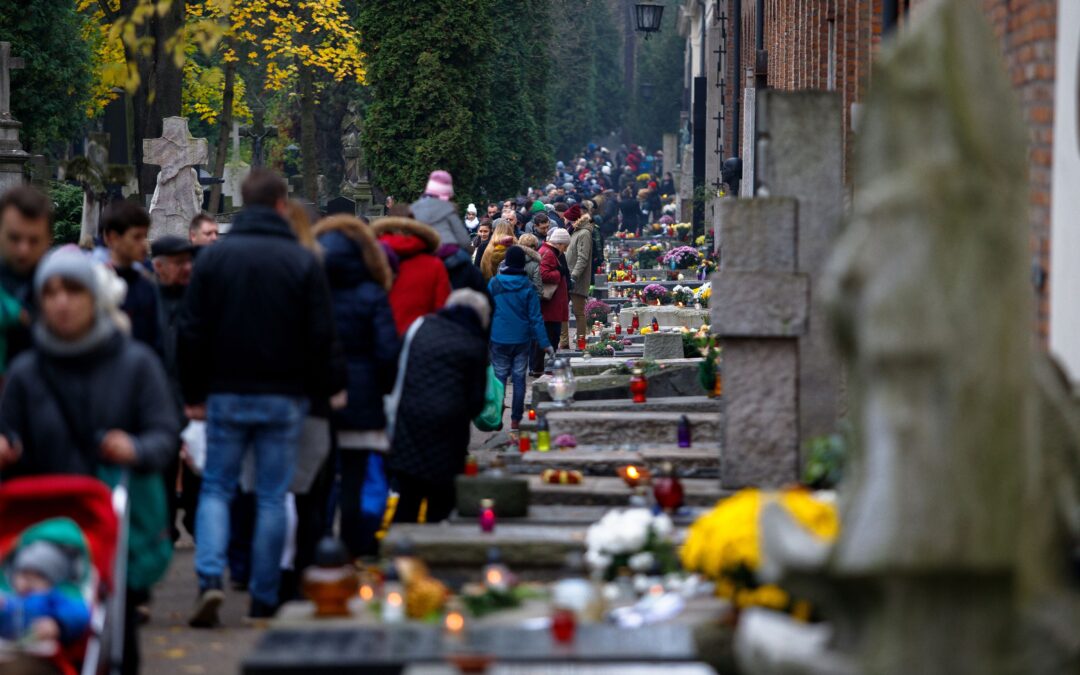All Saints’ Day on 1 November – when millions of Poles usually visit cemeteries to pay respects and leave candles at graves – may be very different this year amid the pandemic.
Epidemiologists have warned that the gatherings could lead to further coronavirus outbreaks, with the country already struggling amid its highest ever level of infections and deaths.
While the government mulls over ways to thin out the crowds, many businesses that cater to cemetery-goers over the holiday fear a big drop in revenue.
Kraków's Rakowicki Cemetery today, as millions of Poles leave candles on family graves for All Saints' Day (pics via @lovekrakow) pic.twitter.com/U2zJTKESBn
— Notes from Poland 🇵🇱 (@notesfrompoland) November 1, 2017
On Monday, the government announced that it will not introduce an additional day off work on 2 November. This idea had been considered as a means of spreading out cemetery attendance over a longer period.
The health minister, Adam Niedzielski, also said that imposing limits on visitor numbers at cemeteries, or even closing them, was unlikely. This echoed earlier comments by deputy prime minister Jarosław Gowin, who told Polsat News that shutting graveyards and preventing “this great Polish tradition” was “out of the question”.
“[All Saints’ Day] is a holiday deeply rooted in Polish culture,” said Niedzielski yesterday, quoted by TVN24. “For now, we are of the opinion that we cannot imagine closing cemeteries or restricting movement in an administrative way.”
Amid record coronavirus infections, some have suggested cemeteries could be closed around All Saints' Day, when millions of Poles visit family graves
A government spokesman says there are currently no such plans but they hope people will be "very careful" https://t.co/ZSSLBweFrO
— Notes from Poland 🇵🇱 (@notesfrompoland) October 5, 2020
Instead, the health minister appealed to the public to themselves take responsibility for planning visits to graves over a longer period, using the days before and after 1 November.
“We encourage everyone, but most of all seniors, not to pile up their visits on 1 November, but to try to systematically arrange them in the week preceding and in the week following 1 November,” he said.
The municipal authorities in Sopot, a city that has been hard hit with coronavirus cases, have, however, appealed to the government and church to take further steps to limit attendance in churches and at graveyards around the holiday.
Meanwhile, prospects for businesses catering to All Saints’ Day in Poland are also looking grim this year.
Of the 300 million sales of grave candles (znicze) each year in Poland, two-thirds take place around 1 November, when shops are piled high with them.
Most are produced by around 300 Polish firms, making up a market estimated at 1 billion zloty (€220 million) annually. This year earnings might diminish as more Poles decide to skip cemetery visits, reports Business Insider.
Florists are in an even tougher situation than candle-sellers, as any stock which they do not sell this year cannot be kept over till 2021. Many small-scale sellers at cemeteries are concerned about laying out cash to purchase merchandise amid the uncertainty of how many people will attend this year, and when they will do so.
“We have to wait until the beginning of November for a final assessment of changing demand, but we already see a decline in sales at traditional selling points outside cemeteries and in flower shops,” says Mirosław Kuk, a spokesman for Ciech, a chemical company producing grave lanterns, cited by Business Insider.
Spotted a genuine K67 “yugokiosk” – one of 7,500 polyfibre and glass modular structures that once symbolised the capitalist revival in eastern Europe – here outside a cemetery in Radomsko, a town in central #Poland pic.twitter.com/9mCAZYzdvG
— Maria Wilczek (@mariawilczek) October 17, 2020
According to Polwax, another producer, Poles are increasingly opting for better quality and more expensive grave candles. He notes that demand for oil-based candles has dropped, as more Poles buy cleaner paraffin ones.
Moreover, amid ecological concerns around waste produced at All Saints’ Day, growing numbers of Poles are choosing to replace the candles within grave lanterns, rather than throwing away the whole thing and buying a new one the next year.
Biedronka, a large discount chain in Poland which last year sold 27 million grave lanterns in the six weeks around 1 November, this year reports a 40% rise in sales of candles to refill lanterns, notes Business Insider.
Main image credit: Ministry of Foreign Affairs of Poland/Flickr (under CC BY-NC 2.0)

Maria Wilczek is deputy editor of Notes from Poland. She is a regular writer for The Times, The Economist and Al Jazeera English, and has also featured in Foreign Policy, Politico Europe, The Spectator and Gazeta Wyborcza.




















